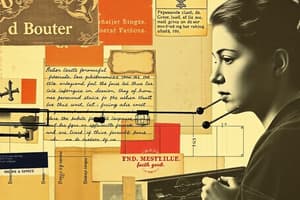Podcast
Questions and Answers
What is a crucial aspect of effective note-taking strategies?
What is a crucial aspect of effective note-taking strategies?
- Taking notes without visuals
- Memorizing information word for word
- Relying solely on reading
- Active listening and summarization (correct)
How does time management contribute to studying?
How does time management contribute to studying?
- By reducing the need for reviewing material
- By enabling procrastination before major tasks
- By providing unlimited time for every subject
- By helping in effective task completion and prioritization (correct)
Which method involves dividing a note page into cue, notes, and summary sections?
Which method involves dividing a note page into cue, notes, and summary sections?
- Mind Mapping
- Cornell Method (correct)
- Outlining
- Sketchnoting
What is the purpose of using visual aids in studying?
What is the purpose of using visual aids in studying?
What technique is used to express ideas in different words while retaining their meaning?
What technique is used to express ideas in different words while retaining their meaning?
What is the main benefit of active recall in studying?
What is the main benefit of active recall in studying?
Why is breaking down complex subjects into manageable sections useful?
Why is breaking down complex subjects into manageable sections useful?
Which of the following methods is a non-linear approach to note-taking?
Which of the following methods is a non-linear approach to note-taking?
Flashcards
Note-Taking Strategies
Note-Taking Strategies
Methods for capturing and organizing information from lectures, readings, and other sources.
Information Gathering
Information Gathering
Process of collecting and compiling data from various sources.
Time Management
Time Management
Strategies to allocate time effectively for studying and completing tasks.
Reviewing
Reviewing
Signup and view all the flashcards
Topic Breakdown
Topic Breakdown
Signup and view all the flashcards
Logical Flow
Logical Flow
Signup and view all the flashcards
Visual Aids
Visual Aids
Signup and view all the flashcards
Active Recall
Active Recall
Signup and view all the flashcards
Study Notes
General Notes
- These notes are for study purposes and provide a summary of the requested topic.
- Focus is on clarity and brevity, with a structured format.
- Information is factual and avoids personal opinions or speculation.
- Data and key concepts are highlighted using bullet points.
Study Methods
- Note-Taking Strategies: Active listening, summarization, paraphrasing, and using visuals (mind maps, diagrams) are crucial for understanding and retaining information.
- Information Gathering: Researching and collating information from diverse sources to form a comprehensive understanding of a topic.
- Time Management: Effective time allocation and prioritization help in efficiently completing tasks and studying.
- Reviewing: Repeated review and active recall are key to solidifying understanding of the material, helping in retention and application to diverse situations.
Organization and Structure
- Topic Breakdown: Breaking down complex subjects into manageable sections or topics for better understanding. Subheadings are used to highlight important points.
- Logical Flow: Organizing ideas in a logical order or sequence to present a coherent structure aiding understanding.
- Use of Visual Aids: Diagrams, flowcharts, and other visuals can enhance understanding and memory recall. These aids improve engagement with topic materials.
- Key Concepts: Identifying and highlighting important concepts and ideas with clear explanations.
- Detailed Explanations: Elaborating on information to ensure full comprehension.
Note-taking Techniques
- Mind Mapping: A non-linear approach to note-taking that uses visuals to connect ideas.
- Outlining: A structured format that organizes information hierarchically, often used with lists and sub-points.
- Cornell Method: Dividing the page into sections (cue, notes, summary) that aid in note-taking and review.
- Sketchnoting: Combining visual elements with text to make notes more engaging and memorable.
- Paraphrasing: Expressing ideas using different words while maintaining the meaning to reinforce understanding.
- Summarizing: Condensing information into shorter, impactful points emphasizing key ideas.
- Active Recall: Testing yourself on learned material to stimulate memory retention. Strategies like flashcards are examples of active recall.
Note-Taking Tips
- Use Abbreviations and Symbols: Abbreviations and symbols can speed up note-taking while maintaining clarity.
- Key Words and Phrases: Using keywords and phrases facilitates retrieval of information during review.
- Consistent Format: Following a consistent format when taking notes helps for quicker retrieval of information.
- Active Listening: Focus and pay attention during lectures or conversations with the intention to retain information.
- Regular Reviewing: Reviewing notes regularly enhances memory retention and understanding.
Studying That Suits You
Use AI to generate personalized quizzes and flashcards to suit your learning preferences.
Description
This quiz covers essential study methods including note-taking strategies, effective information gathering, and time management techniques. Review key concepts to enhance your understanding and retention of study material. Perfect for students seeking to improve their academic skills.




